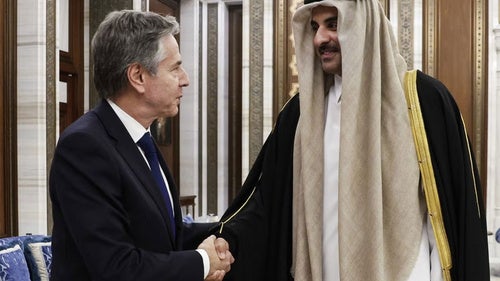Explainer: How US Ties in the Middle East are Preventing a Regional War (So Far)

The U.S. has official relationships with nearly every country in the Middle East. Israel, a close U.S. ally, has official ties with only five.
In short: Amid the Israel-Hamas war and increased tension in Middle Eastern countries, the U.S. has been using its diplomatic ties in the region to try to prevent an escalating conflict. U.S. Secretary of State Antony Blinken is touring the Middle East this week, where the U.S. has official relationships with nearly every country. Israel, a close U.S. ally, has official ties with only five.
What diplomatic ties do the U.S. and Israel have in the Middle East?
Blinken is visiting with leaders in the Middle East and Europe to try to ease tensions and prevent a regional war. Blinken’s travels will include stops in Turkey, Greece, Jordan, the United Arab Emirates, Saudi Arabia, Israel, the West Bank, and Egypt.
According to the U.S. State Department, the Middle East (which, along with North Africa, it calls the Near East) consists of 18 countries and one non-nation, the Palestinian territories. The U.S. has official diplomatic relations with every Middle Eastern country except for two: Iran and Syria. The U.S. severed diplomatic ties with Iran in 1980 after Iranian students took over the U.S. embassy in 1979 and held over 50 Americans hostage. The U.S. cut official diplomatic ties with Syria in 2012 amid the Syrian civil war, although the U.S. continued humanitarian aid to the country.
Israel has official ties with five Middle Eastern and North African countries: Bahrain, Egypt, Jordan, Morocco, and the United Arab Emirates.
Three of those official relationships were established in 2020 with the signing of the Abraham Accords.
Since the U.S. maintains more ties to Middle Eastern countries than Israel, the U.S. has served as a negotiator between Israel and other nations.
Blinken acknowledged Israel's "own efforts, over many years, to build much better connectivity and integration in the Middle East," and told the country's foreign minister during his visit, "I think there actually are real opportunities there," according to The New York Times.
What is Iran’s role in the potential escalation of a regional war?
Iran is only one of two countries in the Middle East with which the U.S. does not have an official relationship. The country backs multiple groups involved in rising regional tensions in the Middle East, including Hamas in the Gaza Strip, Hezbollah in Lebanon, and the Houthis in Yemen.
Iran calls the network of groups it supports the “axis of resistance.” Recently, the Associated Press reported that the groups in this alliance, excluding Hamas, are ramping up attacks in the Middle East to make a continuation of the Israel-Hamas war a too costly endeavor for Israel and the U.S.
Most of the localized conflicts led by these groups “are really linked in some larger, overarching way to the main conflict, which is Iran on one side and the U.S. and Israel on the other,” NPR national security correspondent Greg Myre said on a Jan. 4 episode of Morning Edition.
Iran has also been strengthening its relationships with China and Russia, prompting concern among U.S. leaders.
Meanwhile, Lebanon-based Hezbollah has been fighting with Israel at the southern border of Lebanon. Most recently, an Israeli airstrike killed a Hezbollah commander, which is predicted to bring tensions even closer to a boiling point between Israel and Hezbollah. Israel has warned of “another war” with the group, which is of particular concern to the U.S., which has worked to maintain “close and cordial ties” with Lebanon since the withdrawal of troops in 1984 after Israel’s invasion in 1982.
A recent report from the U.S. Defense Intelligence Agency found that it would be hard for Israel to successfully fight both Hamas and Hezbollah with the resources it has, according to The Washington Post.
In the Red Sea, Houthis have been launching drone and missile attacks to keep ships from delivering goods to Israel. The U.S. leads a coalition of countries meant to protect shipping routes in the Red Sea, but the Houthis have warned that any country involved in the coalition will be targeted. China’s largest shipping company reportedly stopped traveling its route to Israel amid the increased tensions.
Israel has continued its bombardment of the Gaza Strip, which began on Oct. 7 following a Hamas-led attack against Israel that killed about 1,200 Israelis and captured more than 200 hostages. In response, Israel launched a “complete siege” on Gaza, including cutting off its access to food and electricity, and waging “the deadliest and most destructive” military campaign in recent history, the Associated Press reported.
What’s next?
Blinken will continue visiting with leaders in the region through Jan. 11.
In a meeting with the president of the United Arab Emirates, Sheikh Mohammed bin Zayed Al Nahyan, the State Department said Blinken “emphasized the importance of preventing further spread of the conflict and stressed continued U.S. commitment to securing lasting regional peace that ensures Israel’s security and advances the establishment of an independent Palestinian state.”
Last September, Israel announced it was “at the cusp” of starting official relations with Saudi Arabia. However, as Israel has continued military operations in the Gaza Strip, normalizing relations with Saudi Arabia has slowed given that one of the country’s demands for creating a relationship was progress toward the creation of a Palestinian state.
Any Israeli hopes for normalizing relations with other Middle Eastern countries soon are “off the table,” said Middle East Council on Global Affairs fellow Omar Rahman at the Doha Forum in December 2023.

